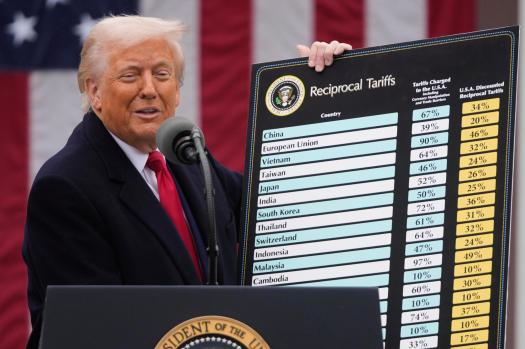UPDATE: The U.S. Supreme Court is set to hear urgent oral arguments on July 12, 2023, as challenges mount against President Trump’s sweeping global tariffs imposed on virtually every nation. The Court’s decision could redefine presidential powers regarding foreign trade and economic policy.
Legal experts argue that Trump’s reliance on the International Emergency Economic Powers Act (IEEPA) to justify these tariffs is unconstitutional. Petitioners are urging the Supreme Court to recognize that Congress alone holds the exclusive powers to tax and regulate foreign commerce, and cannot delegate these authorities to the president in such an extensive manner.
The implications are profound: if the tariffs are upheld, it could grant the president near-unlimited authority to impose protectionist measures under the guise of foreign policy—even against allied nations like the United Kingdom, Canada, and France. Critics argue that this interpretation distorts the actual foreign policy powers granted to the president, which are intended for specific threats, particularly during wartime.
Historically, the IEEPA was designed for emergency situations, allowing the president to impose trade restrictions against enemy nations during declared conflicts. The current tariffs, however, target the entire globe, raising questions about their legitimacy. “The idea of a tariff on commerce with an enemy in wartime makes little sense,” said legal scholar Aditya Bamzai from the University of Virginia School of Law. “A truly threatening enemy would be subjected to an embargo, not a tariff.”
The upcoming Supreme Court deliberations hold significant weight for American citizens, as they may not only impact trade but also the separation of powers within the U.S. government. Should the Court rule in favor of the administration, it could set a precedent for future administrations to activate sweeping economic policies without congressional oversight.
As the nation watches closely, the stakes are high. A ruling against Trump could restore congressional authority over trade, ensuring that the legislative branch retains its critical role in managing foreign relations and economic policy. Conversely, a ruling in favor of the president could lead to a new era of unilateral executive control over trade, fundamentally altering the balance of power.
The Supreme Court’s decision is expected to be released later this month, leaving citizens and lawmakers alike on edge as they await a resolution that may reshape U.S. economic strategy and governance. What happens this week will likely echo in the halls of Congress and beyond for years to come.
Stay tuned for the latest updates as this developing story unfolds, as the implications for U.S. foreign policy and domestic economic conditions are profound and immediate.







